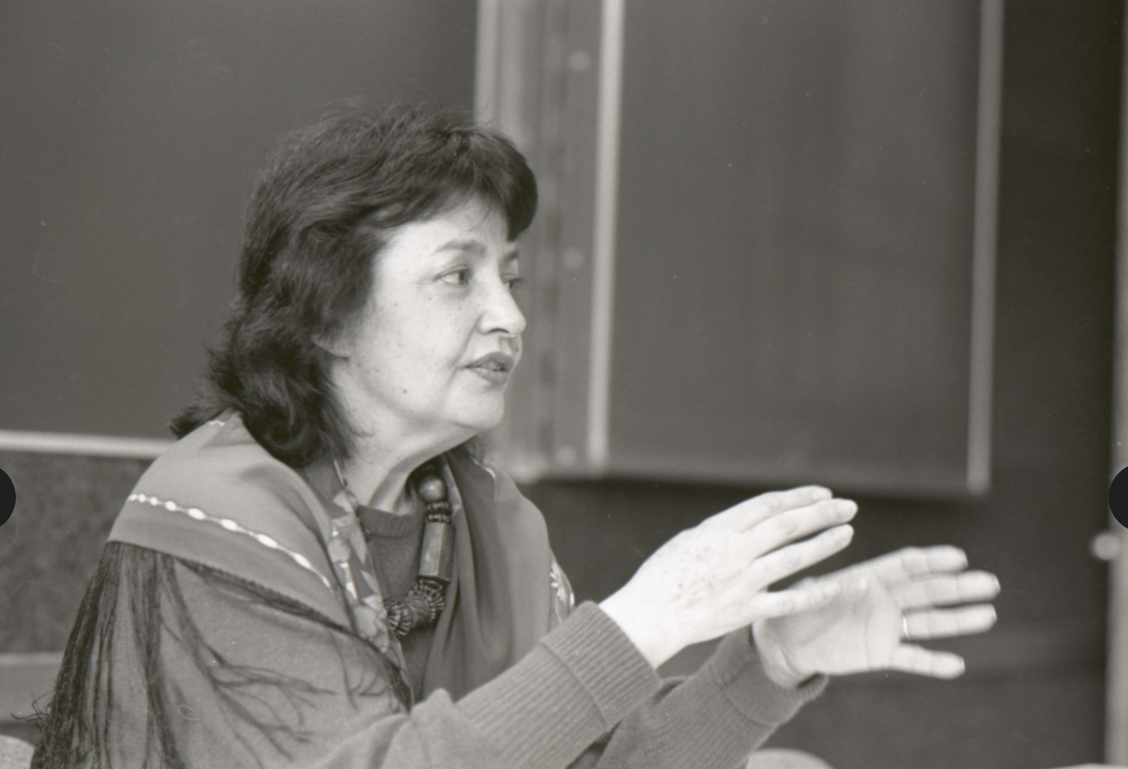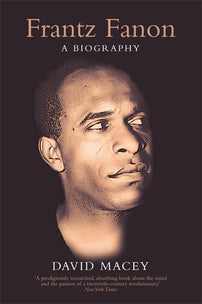Josie Fanon and her fidelity to Palestinian liberation
Throughout her almost thirty-year-long career as a journalist and political analyst, Josie Fanon’s gaze remained fixed on Palestine.

In June 1967, Josie Fanon sent an urgent telegram from her home in Algiers to the Paris office of Francois Maspero, the French publisher of Frantz Fanon’s Wretched of the Earth. In the telegram Josie instructed Maspero to ‘please immediately omit from all future editions Jean-Paul Sartre’s preface to Frantz Fanon’s book Les Damnes de la Terre because of the pro-Zionist and pro-imperialist position taken by its author with respect to Zionist aggression against Arab peoples’. A few weeks prior, Sartre had signed a manifesto of French intellectuals in favour of Israel’s security and sovereignty in the Six Day War. For Josie, anyone who had read Wretched of the Earth and did not show unwavering solidarity to the Palestinian cause had simply not understood the text.
She believed it was time to ‘draw a line. Forget Sartre and the others. Let us reread the conclusion of Les Damnes de la Terre: if we are to meet the expectations of our peoples, we must look elsewhere than in Europe’. In her own words, Josie saw her rejection of the preface as her ‘final tribute to the memory of Fanon and his political clairvoyance’. Despite her ‘status’ as Frantz’s widow, Maspero ignored Josie’s instructions. While the preface was technically removed from the bound volume of the reprinted edition, Maspero printed the preface as a poster, which was folded and inserted into the book as a ‘supplement’.
[book-strip index="1"]
Josie’s apprehension towards Sartre was not new and reflected her wider distrust of the ‘French Left’ – she no longer felt she had anything in common with them. Frantz and Sartre met only once, in Rome in the summer of 1961. Years later, Josie wrote that during this meeting Sartre had told Frantz he was ‘the only black man in front of whom I forget that he is black’. That single meeting in Rome in 1961 has shaped decades worth of scholarship. Biographers and scholars of Fanon do not generally ignore Josie’s demand that the preface be removed, but it is used as an opening to discuss the relationship between Frantz and Sartre or is leveraged in debates around Sartre’s Zionism – never to discuss Josie herself. Over fifty years later, as Israel continues to starve, bomb, and maim Palestinians, I believe it’s time to place this demand in the appropriate context; within Josie Fanon’s decades long fidelity to Palestinian Liberation.
Reflecting on her own upbringing in France, Josie believed that ‘every European was born a racist’ but that access into ‘the brotherhood of man’ could be facilitated through a long ‘apprenticeship’. For Josie, this apprenticeship required effort but could be accelerated by various circumstances. Her time in Algeria served as the catalyst for this accelerated process.
At thirty-two years old, Josie Fanon was a widow and single mother. She returned to Algeria with her son in 1962, only a few months after independence. In a 2018 interview, Josie and Frantz’s son, Olivier, remarked that his ‘mother’s attachment to Algeria was immediate’ and, like Frantz, was embedded within National Liberation Front (FLN) structures fighting against French-colonial rule.
Soon after her return, she began writing for El Moudjahid, the once resistance movement dossier turned official state media. In 1969, Yasser Arafat, head of the Palestinian Liberation Organization, addressed crowds at the Rabat Summit Conference – a meeting that established the Organization of the Islamic Cooperation following an Israeli attack on Al-Aqsa Mosque in occupied Jerusalem – and declared that the Palestinian revolution was ‘complementary’ to the Algerian Revolution. This perspective was shared in the pages of El Moudjahid and reflected the FLN’s broader commitment to Algeria’s Arab-Muslim identity and its solidarity with Palestine.
Throughout her almost thirty-year-long career as a journalist and political analyst, Josie’s gaze remained fixed on Palestine. Palestinian freedom sat at the centre of her Third World politics, her writing knitting together critiques of Zionism, colonialism, and imperialism.
Josie’s first role at El Moudjahid was as a news reporter focusing on Latin America and Africa. In this capacity, she joined Elaine Mokhtefi in Havana as the FLN’s official press envoy at The First Conference of the Latin American Organization of Solidarity (OLAS) in 1967. Tasked with expanding the fight against US imperialism, OLAS aimed to build on the momentum generated by the First Tricontinental Conference on Revolutionary Solidarity held in January of the previous year. The conference served as the largest assembly of active guerrilla fronts in Latin America and saw over 157 foreign journalists registering for credentials.
[book-strip index="2"]
With OLAS focusing on driving the Cuban revolution, it isn’t surprising that press emerging from the conference centred the relationship between the United States and Latin America, supplemented by condemnation of the ongoing US aggression in Vietnam. While Josie’s reporting didn’t deflect from these issues, she was mindful of highlighting the relationship between US imperialism and the ‘Palestinian problem’. For her the ‘presence of troops in Vietnam, the attempted invasion of Cuba, the intervention of mercenaries in the Congo’ could not be disentangled from the ‘cowardly and imperialist Zionist aggression against the Arab peoples’. The problem of Palestine could not simply be boiled down to religion or race but part of an ‘aggressive imperialism’ out of which emerged the ultimate ‘artificial creation’ of this imperialism-Zionism.
Josie’s criticism of Israel continued to extend beyond regional boundaries. In March 1970, less than two months after Biafra’s surrender to the Nigerian federal government, Josie travelled to the former secessionist territory as an El Moujahid official correspondent. Her reporting from this trip was focused on lifting the veil on what had initially been perceived as a regional civil conflict, revealing the war’s many international players.
Following Nigeria’s independence from Britain in 1960, Israel immediately began work to establish diplomatic and economic ties, with Nigeria becoming the primary destination for the activities of Israeli-owned businesses in Africa. The war in 1967 threatened Israel’s neo-colonial agenda in Nigeria, to protect their standing regardless of the outcome, Israel began supplying both Biafra and the Nigerian federal government with military aid and weapons. The extent of Israel’s sinister double game in the Biafra war is made clear through the tens of thousands of pages of cables found in the Israeli State Foreign Ministry’s archives. During her visit, Josie wrote of her amazement at how many abandoned weapons remained and were still being collected. ‘Mixed with the Western weapons, a soldier showed me some derisory but nonetheless effective grenades. I confess that I didn’t see any Zionist weapons but for good reason as Zionist weapons are American.’
Equally critical of the relationship between Israel and South Africa’s Apartheid government, Josie demonstrated both profound knowledge and staunch condemnation of South Africa’s apartheid regime. Publishing numerous articles in support of the African National Congress resistance movement, she eventually visited South Africa in the ’80s. Speaking to me in 2023 about her friendship with Josie, renowned francophone novelist and critic Maryse Condé credits Josie with the ‘origin of her cosmopolitan ideas’ adding that ‘she initiated me to the problems of apartheid in South Africa which I hadn’t considered very much’.
In an article published in 1979 titled ‘Zionism is Racism’, Josie explored the decades long relationship between Israel and the National Party in South Africa that was based on ‘shared ideology, political and economic interests, and a common strategy towards African and Arab countries’. She argued that the media of the time downplayed this collaboration and insisted that it extends beyond the diplomatic visits and their alignment at the United Nations;
But when, at the time of the Arab-Israeli war of October 1973, we learn that a South African Mirage has been shot down on the Suez front, or when, in 1976, we learn of the presence of Israeli instructors in the South African army in preparation for the invasion of Angola, we must assume that these occasional manifestations of military cooperation reflect an alliance on a much wider scale. The Israeli and South African intelligence services also collaborated closely in the repression of black nationalists and Palestinian militants. In 1974, for example, the trial of the Israeli commando accused of murdering Ahmed Bouchikhi in Norway revealed the participation of South African agents in this cooperation of international terrorism.
Like many who shared her political commitments to the Third World, Josie’s criticism of the United Nations was not limited to Palestine. She was a vocal opponent of the dominant role of the US, and in 1979 published a dossier dedicated to Andrew Young; the former United States Ambassador to the United Nations who was forced to resign following a meeting with a Palestine Liberation Organization (PLO) official. The dossier explores both the likelihood and potential of a black pro-Palestinian lobby emerging at the UN, underscored by the understanding that any progressive lobby preaching ‘justice’ needed to be committed to Palestinian freedom.
Josie shared Angela Davis’ view that Palestine is a ‘moral litmus test’. As her reputation grew as a skilled and trusted interviewer giving her access to some of the most influential anti-colonial voices of the time (Che Guevara, Eldridge Cleaver, Julius Nyerere and George Silundika) she rarely missed the opportunity to bring up the importance of Palestinian solidarity.
[book-strip index="3"]
‘Nous sommes tous Palestiniens’ (‘We are all Palestinians’) is the title of one of the last essays Josie published. In it, Josie returns to the claim she made over a decade prior, about the importance of being born into a ‘conscious life’. With this consciousness comes the realisation that you have ‘justified the unjustifiable and made sacred what shouldn’t be’. She rejects what she refers to as the false politics and ‘complicated mechanisms that veil Zionist mystifications’ insisting that we return to ‘the land of lucidity’ where we may find humanity.
I end this in the same way Josie Fanon ended her essay over forty years ago. ‘There is nothing more to say. There are no promised lands except the ones we carry within us.’
Image: University Archives (RG 171), Robert S. Cox Special Collections and University Archives Research Center, UMass Amherst Libraries



